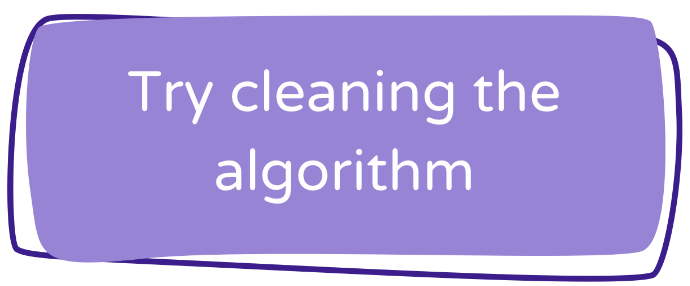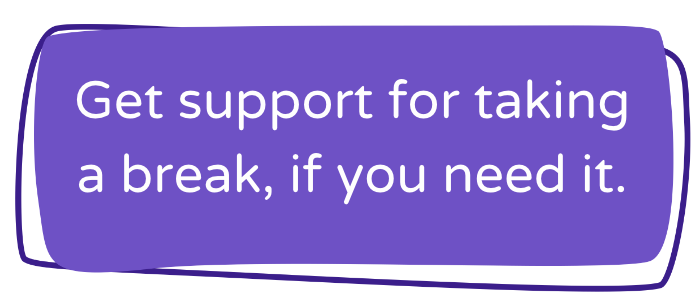
If you are feeling low in mood, even depressed, it can be difficult to know how much going online can help lift your mood or make it worse. As always with stem4 tips, our aim is not to create rules that would somehow be right for everyone, but instead, the tips help you think about your situation and empower you to decide what’s right for you.
It’s important to recognise that you may feel differently on different days, and so what is right for you one day may need to change the next day. Try to notice what brings about positive change for you, and let that guide your choices.
Tips on how to navigate social media when feeling low

If your mood is low, you might find different types of content can have a positive or negative impact on you. This may sound obvious, but for some people, seeing a beautiful landscape, a kitten, or really funny video can lift their mood a little when they are low, and help give them a break from feeling so down. But for others, or even that same person on a different day, who may be struggling to enjoy anything, let alone laugh, there is more comfort in reading, listening or watching something relatable, as they feel the creator really gets how it feels. But be reflective as to whether watching such content provides comfort to the darkness you feel or whether it may make you feel worse. So be careful not to feel too drawn to a more hopeless view of life, as those darker views might make you feel worse.
Don’t forget that recommender systems can still send content that may be triggering, and you can’t control everything.

Many young people are now cautious about what they like or share online, knowing that they may be sent even more of that type of content by algorithms. To keep their newsfeed more positive, they like and share more positive content, to try and get more balance, and avoid triggering content. Trying to ‘clean’ the algorithm is important because it can help you escape from the things you did in the past, when your mood may have been lower and darker content was more comforting. Algorithms do not always change when your mood improves, and will still send the older type of content that used to be right for you. So trying to keep some balance in what you engage with could help you later.
It’s important to report what may be distressing or content that is triggering for you to the App, as that could also help others. It is a good idea to remind yourself how to do that, so you can protect yourself if you need to.
As things can feel more intense when your mood is low, you may need to take a break from negative content and social media, to reduce information overload, and feel more in control.

Low mood or depression can sometimes distort your thinking which becomes more negative and makes it difficult to generate positive thoughts about the future. It is important to remember change is always possible, and you deserve to give yourself the chance of feeling better again. But watchout for the influencers and tips that make recovery sound simple or suggest doing something that doesn’t make much sense. There are simple things that you can do to boost your mood, but use advice and tips from real experts, such as those suggested in our Move Mood app.
Just as there may be tips for hope and recovery online, sometimes there may be harmful or extreme messaging or unhelpful group pressure. Be wise in protecting yourself against such harm by moving away from such messages and groups and instead seek positive support, to keep up hope and give yourself a chance for a better future.
Peer pressure can be a real issue, and it is important to avoid anything that encourages something harmful.

Many people who go online, when low, are searching for social connections that make them feel less alone in their struggles, and hopefully brighter. It can feel such a relief to find someone who seems to feel the same as you do, almost like a twin. Similarly, like having a twin, it can create a sense of connection and comparison. However, everyone is different, and it is important to not give into pressure to feel the same as someone who may be feeling either better or worse than you.
It can be difficult if you also feel they are relying on you for support, as that might be too much for you, and being clear about what you can manage is actually kinder than suddenly stopping contact because you are feeling overwhelmed. It is often better to engage with people who know how you feel, but are recovering, even though even someone who is recovering will still have some bad days.

Taking a break from social media or Apps, to sort out your thoughts and work out how to feel better can be helpful. However, taking this step is not always easy, so working it out with someone you trust, and if possible, someone older than you or an adult will help. Having a break may be particularly helpful if it’s hard to disengage from being online, if your time online often makes your mood worse, or if there is pressure from others to stay online and keep responding.
But how we take a break and plan for that can make a huge difference to friendships and relationships.
If anything in this article has affected you or you would like to seek help, please give yourself the support you deserve, and reach out to one of the helplines below:
| Further advice | Details | Availability | What they say |
|---|---|---|---|
| URGENT SUPPORT | |||
| Shout | Text Shout to 85258 (free) | 24 hours a day, 7 days a week | Shout is a free, confidential, 24/7 text support service for anyone in the UK who is struggling to cope. To start a conversation, text the word 'SHOUT' to 85258. Our trained volunteers are here to listen at any time of day or night, and messages won't appear on your phone bill. If your life is at imminent risk, call the emergency services on 999. |
| HOPELINE247 (Papyrus) | Call 0800 068 4141 (free) Text 88247 Email pat@papyrus-uk.org | Lines are open 24 hours every day of the year (Weekends and Bank Holidays included) | HOPELINE247 advisers want to work with you to understand why thoughts of suicide might be present. They also want to provide you with a safe space to talk through anything happening in your life that could be impacting on your or anyone else’s ability to stay safe. * For children and young people under the age of 35 who are experiencing thoughts of suicide * For anyone concerned that a young person could be thinking about suicide Young people Our advisers are all trained to help you focus on staying safe from suicide. Their training enables them to provide advice and support that may help you to move forward and stay alive. Concerned others If you are concerned that a young person is feeling suicidal, advisers can support you to start a conversation about suicide and explore options of how best to support them. |
| Childline | 0800 1111 (free) | 24 hours a day, 7 days a week | When you call on 0800 1111 you’ll get through to a counsellor, they’re there to listen and support you with anything you’d like to talk about. Or you can have a 1-2-1 counsellor chat online. You can also send an email from your locker. We'll try to answer this within a day, but sometimes it can take a little longer. Childline is open 24 hours a day, 7 days a week. So you can talk to us at any time. But we might not be able to talk for as long when it’s after midnight. |
| Samaritans | Call 116 123 (free) Email jo@samaritans.org (Response time: it may take several days to get a response by email) | 24 hours a day, 365 days a year | A safe place for you to talk any time you like, in your own way – about whatever’s getting to you. We won't judge you or tell you what to do, we'll listen to you. |
| NHS 111 | Call 111 (free) | For urgent, non-emergency medical advice. | |
| SUPPORT FOR PARENTS | |||
| Parentline/YoungMinds | 0808 802 5544 | 9.30am—2pm Monday to Friday | Call our Parents Helpline for detailed advice, emotional support and signposting about a child or young person up to the age of 25. You can find out more about the additional Webchat and email support here. |
| Family Lives | Call 0808 800 2222 (free from landlines and most mobiles) Email askus@familylives.org.uk | 9am—9pm Monday to Friday and 10am—3pm Saturday and Sunday | Family Lives offers a confidential and free* helpline service for families in England and Wales (previously known as Parentline). Please call us on 0808 800 2222 for emotional support, information, advice and guidance on any aspect of parenting and family life. If you don’t get an answer first time please do try again. Callers in Scotland - for callers from Scotland, Children First run Children First Supportline and you may wish to contact them on 08000 28 22 33 Monday to Friday from 9am to 9pm, Weekends from 9am to noon. |
| FACE-TO-FACE | |||
| Please see your GP for a referral | Refer to stem4's Asking for Help page which will provide some guidance | ||
| NHS | Find out about the different ways to get help with your mental health, the process, and your rights. Mental health services are free on the NHS. Your mental health is important and you should get help if you need it. |
||
| GENERAL SUPPORT | |||
| YoungMinds | Whether you want to understand more about how you're feeling and find ways to feel better, or you want to support someone who's struggling, we can help. | ||
| NHS Mental Health | Find information and support for your mental health. | ||
| Every Mind Matters | We all have mental health. Find expert advice, practical tips and support if you're stressed, anxious, low or struggling to sleep. | ||
| Mind | Mind Support Line: Call 0300 102 1234 (check your network costs) Mind Infoline: Call 0300 123 3393 (check your network costs) | 9am—6pm Monday to Friday (excluding Bank Holidays) | Mind has a number of helplines that provide a voice at the end of the phone when there's nowhere else to turn. Each line meets a different mental health or wellbeing need – from information and service finding to understanding mental health law. Find out more about Mind's helplines here. |
| Rethink Mental Illness | Call our advice and information helpline on 0808 801 0525 | Monday to Friday, 9:30am - 4pm (excluding bank holidays) | The Rethink Mental Illness advice and information service offers practical advice on a wide range of topics such as The Mental Health Act, social care, welfare benefits, and carers rights. We also offer general information on living with mental illness, medication and care. |
| SELF-HARM | |||
| Harmless | Harmless is the national centre of excellence for self harm and suicide prevention. We save lives by providing support, information, training and consultancy about self harm to individuals who self harm, their friends, families and professionals. | ||
EATING DISORDERS | |||
| Beat | Helpline: England - Call 0808 801 0677 Scotland - Call 0808 801 0432 Wales - Call 0808 801 0433 Northern Ireland - Call 0808 801 0434 | Monday to Friday 3pm—8pm | Beat provides Helplines for people of all ages, offering support and information about eating disorders no matter where you are in your journey. Calls to the helpline are free from landlines and mobile phones within the UK and do not appear on itemised bills. |
| ADDICTION | |||
| Frank | Call 0300 123 6600 (check your network costs) Text 82111 | 24 hours a day, 7 days a week | Honest information about drugs. |
| Al-Anon | UK residents can call free of charge on 0800 0086 811 and Eire residents can call 01 873 2699 | 365 days a year, 10am— 10pm | We are here for anyone affected by someone else’s drinking. Our Helpline is manned by a team of friendly and helpful volunteers who are also members of Al-Anon. They will listen and be happy to answer your questions. Part of Al-Anon, Alateen is for teenage relatives and friends of alcoholics. |
| GamCare | Speak to an Adviser for free: call 0808 8020 133 | 24 hours a day, 7 days a week | The National Gambling Helpline We give confidential information, advice and support, free of charge, for anyone affected by gambling harms in England, Scotland and Wales. |
| YGAM | Evidence-led education to help prevent gaming and gambling harms | ||
| (Page last updated February 2025) |


